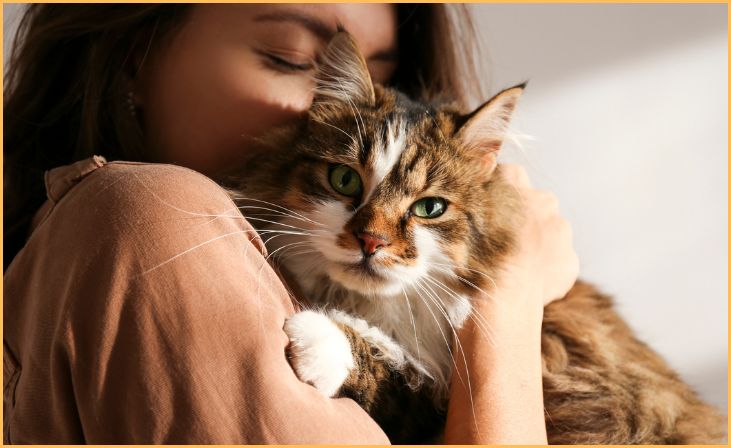Scientific Benefits of Cat Ownership – Cats, among the most beloved companions worldwide, play a significant role in human lives, extending beyond mere companionship to impact our physical and mental well-being. While the joy and comfort they bring are evident, scientific inquiry has delved into the tangible benefits of cat ownership.
This exploration seeks to unravel the physiological, psychological, and immunological advantages that arise from the bond between humans and their feline friends. From stress reduction and cardiovascular health to the potential alleviation of anxiety and depression, this examination will navigate the diverse scientific landscape surrounding the positive impacts of cat companionship.
As we delve into the realms of physical activity, immune system modulation, and therapeutic applications, a compelling narrative unfolds, reinforcing the notion that the presence of cats in our lives may offer a unique array of scientifically substantiated benefits.
Importance of studying the scientific benefits of cat ownership
Studying the scientific benefits of cat ownership is of paramount importance as it sheds light on the tangible and measurable ways in which these feline companions contribute to human well-being. This research not only enriches our understanding of the human-animal bond but also holds implications for public health and individual lifestyles. The following points underscore the significance of delving into the scientific aspects of cat ownership:
- Health Promotion: Uncovering the physical and mental health benefits associated with cat ownership provides valuable insights into strategies for health promotion and disease prevention. Understanding how cats positively impact stress levels, cardiovascular health, and mental well-being can inform holistic approaches to healthcare.
- Informing Therapeutic Practices: Scientific studies on the therapeutic benefits of cats contribute to the development and refinement of animal-assisted therapy. This knowledge can be applied in various healthcare settings to enhance treatment outcomes, particularly for individuals facing mental health challenges.
- Public Awareness and Education: Scientific research provides a basis for educating the public about the advantages of having cats as companions. This awareness fosters responsible pet ownership, encouraging individuals to consider the potential positive impact a cat could have on their lives.
- Social and Cultural Understanding: Exploring the scientific benefits of cat ownership contributes to our broader understanding of the social and cultural roles that pets play in human societies. This knowledge aids in appreciating the significance of the human-animal bond across different cultures and communities.
- Policy and Legislation: Scientific evidence can influence policy decisions related to pet ownership, animal welfare, and support for therapy animals. It may contribute to the recognition of cats as emotional support animals, impacting housing and travel regulations.
- Encouraging Further Research: By highlighting the existing scientific benefits, research in this field encourages continued exploration. This ongoing investigation can uncover new dimensions of the human-cat relationship and its potential implications for diverse aspects of human health..
Also, Read – Vegan Diet Options for Cats
Scientific Benefits of Cat Ownership
Stress Reduction

Owning a cat has scientifically proven stress-reducing benefits. Interacting with cats lowers stress by releasing endorphins, the body’s natural mood enhancers. The calming act of petting a cat can decrease the production of stress-related hormones.
Their presence contributes to lower blood pressure and a reduced risk of heart attack and stroke. The companionship and unconditional love provided by cats improve mood and mental health, decreasing symptoms of depression and anxiety.
Additionally, exposure to cats early in life may lower the risk of allergies and asthma in children. The rhythmic purring of a cat promotes better sleep quality, and engaging in play encourages physical activity, fostering overall well-being.
Lower Blood Pressure
Owning a cat can lead to lower blood pressure. The calming presence of a cat and the act of petting them contribute to reduced stress levels. Studies suggest that cat owners, on average, experience lower blood pressure, possibly due to the soothing effects of feline companionship.
Interacting with a cat triggers the release of endorphins, natural mood regulators that further aid in blood pressure regulation.
The overall relaxation induced by cat ownership may positively impact cardiovascular health, highlighting the therapeutic influence these furry companions can have on one’s well-being.
Heart Health
Cat ownership may positively impact heart health. Studies indicate that owning a cat is associated with a lower risk of heart attack and stroke. The companionship and stress-reducing effects of interacting with a cat contribute to cardiovascular well-being.
The calming presence of a cat, coupled with the act of petting, can lower stress levels and regulate blood pressure. Additionally, the emotional support provided by cats may contribute to overall heart health by reducing feelings of loneliness and fostering a sense of connection.
These cardiovascular benefits highlight the multifaceted positive effects that cat ownership can have on human health.
Improved Mood and Mental Health
Cat ownership is linked to improved mood and mental health. Interacting with cats reduces symptoms of depression and anxiety, offering emotional support and companionship. The act of petting a cat triggers the release of endorphins, natural mood elevators that enhance well-being.
The unconditional love and calming presence of a cat provide a sense of comfort and reduce stress levels. Studies suggest that cat owners experience enhanced psychological resilience, attributing these positive effects to the unique bond formed with their feline companions.
Overall, the emotional connection with cats contributes to a more positive mental state, promoting mental health and happiness.
Also, Read – Cat Breeds With Big Eyes
Decreased Risk of Allergies and Asthma in Children

Early exposure to cats may decrease the risk of allergies and asthma in children. Studies suggest that children raised in households with cats have a lower likelihood of developing these respiratory conditions.
The presence of a cat exposes children to allergens and microbes, potentially strengthening their immune systems and reducing susceptibility to allergies.
While individual responses may vary, the protective effect of early cat exposure highlights a potential link between feline companionship and a lower risk of respiratory issues in childhood. It’s important to note that careful consideration of individual health conditions and allergies is essential before introducing a cat to a household.
Enhanced Immune Function
Owning a cat may contribute to enhanced immune function. Exposure to cat dander and microbes can stimulate the immune system, potentially leading to a stronger defense against common illnesses.
The presence of a cat in the household exposes individuals to a variety of microorganisms, promoting immune system development and resilience. While individual responses may vary, this increased exposure to diverse environmental elements through cat ownership may have positive effects on overall immune function. It’s important to note that maintaining a clean environment and practicing good hygiene is crucial for both human and feline health.
Companionship for the Elderly
Cats provide valuable companionship for the elderly, offering emotional support and reducing feelings of loneliness. The presence of a cat can create a sense of purpose, routine, and a source of joy in the lives of elderly individuals.
Studies suggest that interacting with cats can positively impact mental well-being, contributing to improved mood and a sense of connection. The responsibilities of pet care also provide structure and routine, promoting physical activity.
The unconditional love and companionship offered by cats make them ideal companions for the elderly, fostering a sense of comfort and enhancing overall quality of life in the later years.
Better Sleep Quality
Cats can contribute to better sleep quality. The rhythmic purring of a cat has a calming effect, promoting relaxation and reducing stress. The soothing nature of a cat’s presence may help individuals fall asleep faster and experience more restful sleep.
The companionship offered by a cat can create a sense of security, alleviating feelings of loneliness or anxiety that might interfere with sleep. The calming routine of petting a cat before bedtime can also contribute to a more relaxed state of mind, enhancing overall sleep quality and fostering a positive sleep environment.
Increased Physical Activity
Owning a cat encourages increased physical activity. Engaging in play and interactive activities with a cat promotes movement, providing both mental stimulation for the cat owner and physical exercise.
Activities such as playing with toys, tossing balls, or even interactive games can be enjoyable and help maintain an active lifestyle.
This is particularly beneficial for individuals with a sedentary routine, as the playful interactions with a cat offer a fun and effective way to incorporate movement into daily life. The responsibility of caring for a cat, including playtime, contributes to a healthier and more active lifestyle, supporting overall well-being.
Social Interaction

Cat ownership can enhance social interaction. Whether through online communities, local cat groups, or encounters during outdoor activities with a cat, owning one can foster connections. Sharing experiences and stories about cats can create bonds among cat owners, promoting a sense of community.
Additionally, taking a cat for a walk or visiting pet-friendly spaces provides opportunities to meet and engage with other people. The social aspect of cat ownership extends beyond the relationship with the cat itself, offering a shared interest that can lead to new friendships and a more connected social life.
Conclusion
In conclusion, the scientific exploration of cat ownership reveals a tapestry of benefits encompassing physical health, mental well-being, and therapeutic value. This knowledge not only enriches our understanding of the human-animal bond but also has practical implications for healthcare, public awareness, and policy considerations.
As cats continue to weave their way into the fabric of our lives, acknowledging and furthering these scientific insights fosters a holistic approach to well-being, recognizing the profound impact these feline companions can have on the human experience.
FAQs
Research suggests that cat ownership is associated with a lower risk of cardiovascular diseases. The stress-relieving effects of interacting with cats, combined with the joy they bring, may contribute to improved heart health.
Yes, studies indicate that the companionship of cats can provide emotional support, leading to reduced symptoms of anxiety and depression. The act of petting a cat has been shown to release neurotransmitters that promote a positive mood.
Yes, owning a cat can increase physical activity through play and routine care. The interactive play with cats and the responsibility of caring for them contribute to higher activity levels compared to non-pet owners.







